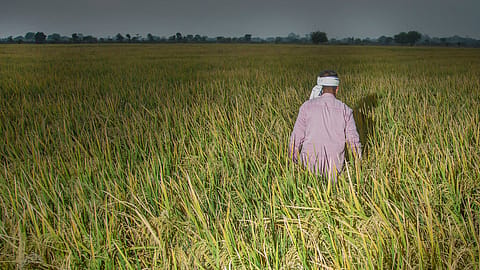Budget 2025: Agriculture should be a priority area and can drive India's growth, say experts
Experts urge bold reforms and funding to drive innovation and sustainability in Indian agriculture.

The agricultural sector across various segments is seeking initiatives and funding to drive innovation and research in the forthcoming Union Budget 2025-26. While some stakeholders are advocating for budgetary support to promote agri-tech, others are calling for financial allocations to develop climate-friendly solutions that can support Indian agriculture.
“The agriculture sector in India faced several challenges in 2024, including unpredictable weather patterns, supply chain disruptions, and increasing sustainability pressures. However, there has also been significant progress, particularly in agri-tech innovations and the government’s commitment to farmer welfare. Looking ahead to Budget 2025, there’s a valuable opportunity to build on this momentum,” says Rajesh Aggarwal, Managing Director of Insecticides (India) Ltd. For the agrochemical sector, he urged the government to focus on incentivising research into eco-friendly and cutting-edge solutions, as well as implementing production-linked incentives (PLI).
Palat Vijayaraghavan, Founder and CEO of Lawrencedale Agro Processing India (LEAF), emphasises the importance of innovation in transforming India’s agricultural landscape. “Budget allocations should encourage research in agri-tech, particularly in areas like AI-driven pest control, soil health monitoring, and blockchain-enabled supply chains. These technologies can revolutionise farming practices, making them more efficient and sustainable. Public-private partnerships (PPPs) can play a transformative role here,” he says. He adds that a policy framework incentivising private sector participation in agriculture—through tax breaks, grants, and streamlined regulatory norms—will drive innovation, attract investment, and scale solutions from labs to fields, benefitting millions of farmers.
The Union Cabinet had already approved a Digital Agriculture Mission on September 2, 2024, with a financial outlay of ₹2,817 crore, including ₹1,940 crore from the central government. Akshat Gupta, Practice Leader, Food & Agriculture at Praxis Global Alliance, expects a renewed focus on the Digital Agriculture Mission in the upcoming Budget. He highlights the need for robust agri-databases and frameworks to modernise farming practices and support private players in developing innovative digital solutions. Gupta also anticipates higher allocations than the previous ₹1.52 lakh crore for agriculture to enhance infrastructure, particularly in cold storage, warehousing, and supply chain management. “These investments are critical to reducing post-harvest losses and improving market access for farmers,” he says.
Care Ratings Ltd also highlights the importance of prioritising agriculture in the Budget through increased allocations for agricultural R&D, farmers’ welfare, and policy reforms.
CropLife India, an association of 17 R&D-driven crop science companies, has proposed several key measures to enhance innovation and R&D, enabling farmers to access newer and greener crop protection products. The association’s recommendations include a 200% weighted deduction on R&D expenses for agrochemical companies, a uniform 10% basic customs duty for both technical raw materials and formulations, a reduction in GST on agrochemicals from 18% to 12%, and budgetary allocations to strengthen extension mechanisms for better outreach and farmer support.
“We urge the government to create an ecosystem centred around a science-based, progressive, and predictive regulatory framework that will allow the sector to become globally competitive and reach its full potential. It is crucial to move away from a dual policy approach that restricts formulation imports in India while promoting formulation exports,” says Ankur Aggarwal, Chairman of CropLife India and Managing Director of Crystal Crop Protection Ltd.